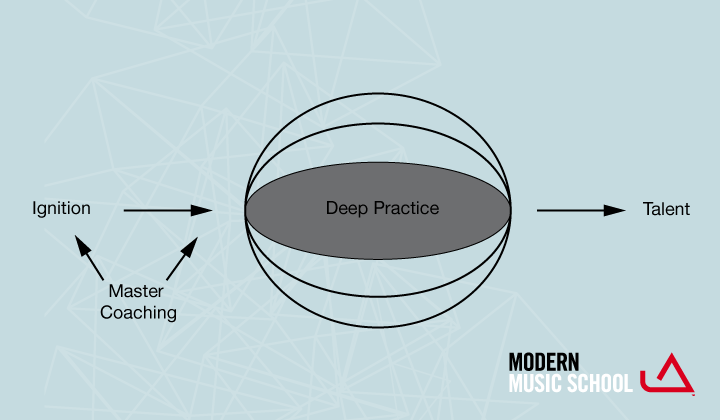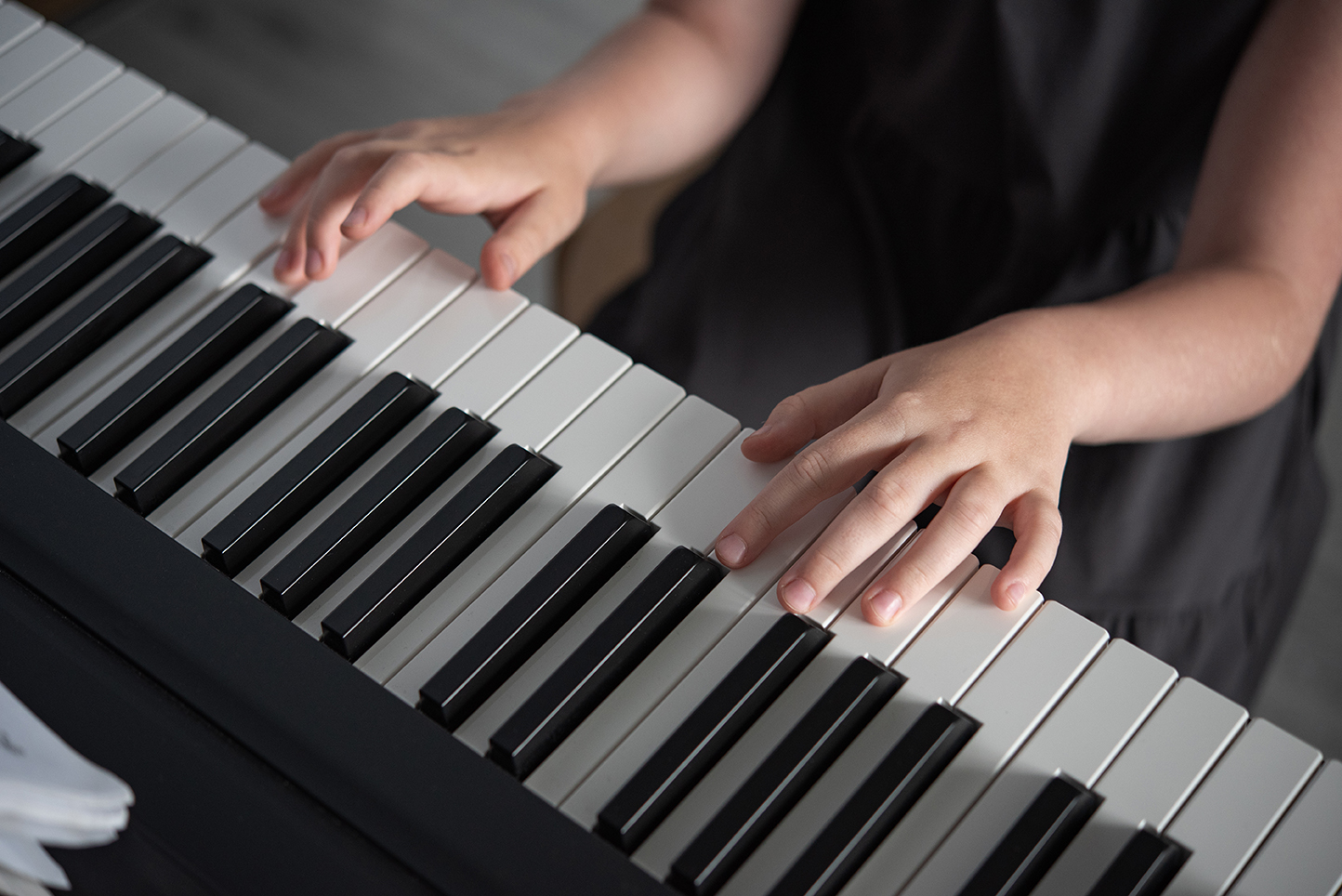The #1 secret to getting really great at anything
Latest Posts • February 22, 2016

Regardless of what you may think, it’s never too late to become a great artist, athlete – or a musician! Talent isn’t something God-given or fixed at birth, it’s a muscle we can grow with time and practice.
Daniel Coyle, the journalist and author of “The Talent Code: Greatness Isn’t Born. It’s Grown. Here’s How,” composed a simple formula for developing any kind of talent:
Ignition + Deep Practice + Master Coaching = Talent.
For his book, he visited and researched various talent hotbeds. He travelled from Brazil to visit a soccer hotbed, to famous American music academy, Meadowmount, and the Spartak Tennis Club in Russia. He came to notice that the real secret to getting great at something lies in deep practice (and all the things that drive it, like ignition and coaching).
What is deep practice?
Deep practice is a system that provides an immediate and non-judgmental feedback loop. It’s a system where tasks are divided into smaller chunks and repeated over and over until they’re perfected.
In deep practice (or deliberate practice) we slow things down, pay attention to details and do lots and lots of repetitions. We make mistakes, start over, make more mistakes, struggle and start from the beginning again. We do this until we start to get it consistently correct.
Deep practice is all about hard work and struggle – it’s about being pushed to the edge of our comfort zone!
Something absolutely magical happens when we’re practicing this way. When we tackle a complex subject in manageable chunks, struggle, stop with every mistakes and don’t move on until we’ve nailed it – our brain builds a brain substance called myelin.
We’ve always known ‘practice makes perfect’ (the right kind of practice). And now thanks to the discovery of myelin and its connection with increased practice and skill, we know why this is so.
Coyle writes:
“Every human skill, whether it’s playing baseball or playing Bach, is created by chains of nerve fibers carrying a tiny electrical impulse – basically, a signal traveling through a circuit.
Myelin’s vital role is to wrap those nerve fibers the same way that rubber insulation wraps a copper wire, making the signal stronger and faster by preventing electrical impulses from leaking out.
When we fire our circuits in the right way – when we practice swinging that bat or playing that note – our myelin responds by wrapping layers of insulation around that neural circuit, each new layer adding a bit more skill and speed.
The thicker the myelin gets, the better it insulates, and the faster and more accurate our movements and thoughts become.”
What he’s saying is that every human skill is located in the brain. And depending on how much myelin we’ve grown to prime the brain – to tell the rest of the body what to do and when to do it – these skills can happen faster and more accurately the more we repeat them.
Coyle and other neurologists consider myelin to be the holy grail of acquiring any skill.
“ • Every human movement, thought, or feeling is a precisely timed electrical signal traveling through a chain of neurons—a circuit of nerve fibers.
• Myelin is the insulation that wraps these nerve fibers and increases signal strength, speed, and accuracy.
• The more we fire a particular circuit, the more myelin optimizes that circuit, and the stronger, faster, and more fluent our movements and thoughts become.”
So for example, when you practice your instrument and exercise certain movements in strict repetition, you’re actually exercising your brain circuits. These, in turn, make your muscles react more quickly and accurately, even to the point where you no longer have to think about it. Your new skill becomes ‘second nature’.
Coyle explains:
“In a profound way the circuit is the movement: it dictates the precise strength and timing of each muscle contraction, the shape and content of each thought… A sluggish, unreliable circuit means a sluggish, unreliable movement; on the other hand, a fast, synchronous circuit means a fast, synchronous movement.”
But deep practice feels uncomfortable and unusual. Few people commit to it. We’re not used to struggling relentlessly for an uncertain payoff – we’re looking for immediate results (and instant gratification).
To commit to deep practice, we need to feel really passionate about a new skill or learning in general. This brings us to the next piece in Coyle’s formula; Ignition.
What is ignition?
Think of ignition as the inspiration or the engine driving your deep practice.
Coyle puts it this way:
“The true expertise of geniuses resides in their ability to deep-practice obsessively.”
According to Coyle, in order to excel at any skill, we have to make ourselves passionate about learning it.
I know this is certainly true for me. Once I found something that intrigues me, I can’t help but want to figure it out and get better at it. I love learning and improving. When my curiosity is sparked, I don’t mind moving past obstacles – even when it means hard work.
On his website, Coyle describes a pattern he observes in all top performers:
“The person who secretly practices harder than anybody else… would describe any number of top performers. Frank Sinatra (who was as dedicated to rehearsals as he was to Scotch), the pianist virtuoso Vladimir Horowitz (who said if he skips one day of practice, he notices; two days, his wife notices; three days, and the world notices), and Tiger Woods (whose daily practice schedule includes three hours at the range, two and a half hours of putting and chipping, and a full 18 holes). They’re all the same story: skill circuits grown and maintained through deep practice.”
So find your own source of ignition – find the things that inspire and motivate you – and start your own obsessive deep practice routine!
The last piece of Coyle’s formula for growing talent is Master Coaching.
What is Master Coaching?
For Master Coaching we simply need great teachers. A Master Coach is someone who encourages us to work hard and who nurtures our belief that we can do it! Master Coaches give us goals to reach for, and most importantly, the feedback we need so we can improve. If you don’t bother correcting your mistakes, you’ll create, strengthen and maintain the wrong skill circuits. A Master Coach will immediately spot those mistakes and get you back on the track to mastery.
This is good news for all musicians. The better we follow the principles of Ignition, Deep Practice and Master Coaching, the better we’ll become.




Leave A Comment